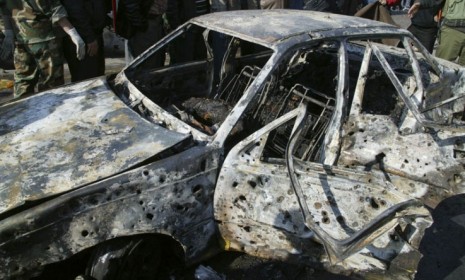Syria's twin suicide bombings: Who's to blame?
The state media says al Qaeda was behind two deadly blasts that killed dozens Friday. Others think the Assad regime may have orchestrated the attacks

A free daily email with the biggest news stories of the day – and the best features from TheWeek.com
You are now subscribed
Your newsletter sign-up was successful
Two car bombs outside state security facilities rocked the Syrian capital of Damascus Friday, killing at least 40 and injuring more than 100, according to officials. Syrian state media was quick to suggest that al Qaeda was behind the suicide bombings, but leaders of the opposition contend the attacks might have actually been orchestrated by Syrian President Bashar al-Assad's regime in a brutal PR ploy to justify his violence against protesters. Who is really behind the bombings?
This is clearly an act of terrorism: "We said it from the beginning, this is terrorism," Syria's Deputy Foreign Minister Faysal Mekdad tells MSNBC. "They are killing the army and civilians," especially civilians. In addition, Jihad Makdesi, a spokesman for the Syrian foreign ministry tells the BBC that Lebanan warned the ministry earlier in the week that "al-Qaeda groups had infiltrated inside Syria through the town of Arsan."
"Syrian government blames terrorists as blasts kill 40, injure 150 others"
The Week
Escape your echo chamber. Get the facts behind the news, plus analysis from multiple perspectives.

Sign up for The Week's Free Newsletters
From our morning news briefing to a weekly Good News Newsletter, get the best of The Week delivered directly to your inbox.
From our morning news briefing to a weekly Good News Newsletter, get the best of The Week delivered directly to your inbox.
"Syria says twin suicide bombings in Damascus kill 40"
Or is it? The bombings were "very mysterious because they happened in heavily guarded areas that are difficult to be penetrated by a car," Omar Idilbi, a member of the Syrian National Council, an umbrella group for those who oppose the regime, tells MSNBC. The timing is also quite convenient, given that it happened just a day after the Arab league arrived in Syria to assure that the regime ends its violent crackdown on protesters. Perhaps the blasts were orchestrated to "to make the Arab League and international public opinion believe that Syria is being subjected to acts of terrorism by members of al Qaeda" and therefore undercut the popular uprising.
"Syrian government blames terrorists as blasts kill 40, injure 150 others"
Either way, it benefits the regime: The attacks "are good news for the regime of President Hafez al-Assad, and bad news for the opposition protest movement," says Tony Karon at TIME. They neatly support Assad's narrative that the uprisings are "not a citizens' movement for democracy, but a sectarian, extremist terror campaign" and so justify his violent crackdowns. Still, while the bombings might benefit the regime's image, it's not unlikely that al Qaeda really is to blame, given Thursday's attacks in Baghdad, apparently by Sunni jihadists, and the fact that Sunni insurgents in Iraq have close ties with Sunni extremists in Syria across the border. While it's certainly feasible that the regime could have orchestrated the attacks, "it would also be naive to deny the existence of a jihadist element" within the opposition movement.
A free daily email with the biggest news stories of the day – and the best features from TheWeek.com
"Why the Damascus bombing is better news for Syria's regime than for its opposition"
-
 Climate change has reduced US salaries
Climate change has reduced US salariesUnder the radar Elevated temperatures are capable of affecting the entire economy
-
 6 gorgeous homes in warm climes
6 gorgeous homes in warm climesFeature Featuring a Spanish Revival in Tucson and Richard Neutra-designed modernist home in Los Angeles
-
 Russia’s ‘cyborg’ spy pigeons
Russia’s ‘cyborg’ spy pigeonsUnder the Radar Moscow neurotech company with Kremlin-linked funding claims to implant neural chips in birds’ brains to control their flight, and create ‘bio-drones’